HTTP server is created by connecting an ENC28J60 module to the mbed board. It is serving a webpage which enables remotely turn on/off LED1 (or other device). Compile, download, run and type 192.168.0.170/secret/ into your web browser and Flot Interactivity Graphique
Dependencies: UIPEthernet mbed FCT_WEB hebergement
Fork of WebSwitch_ENC28J60 by
Page généré :
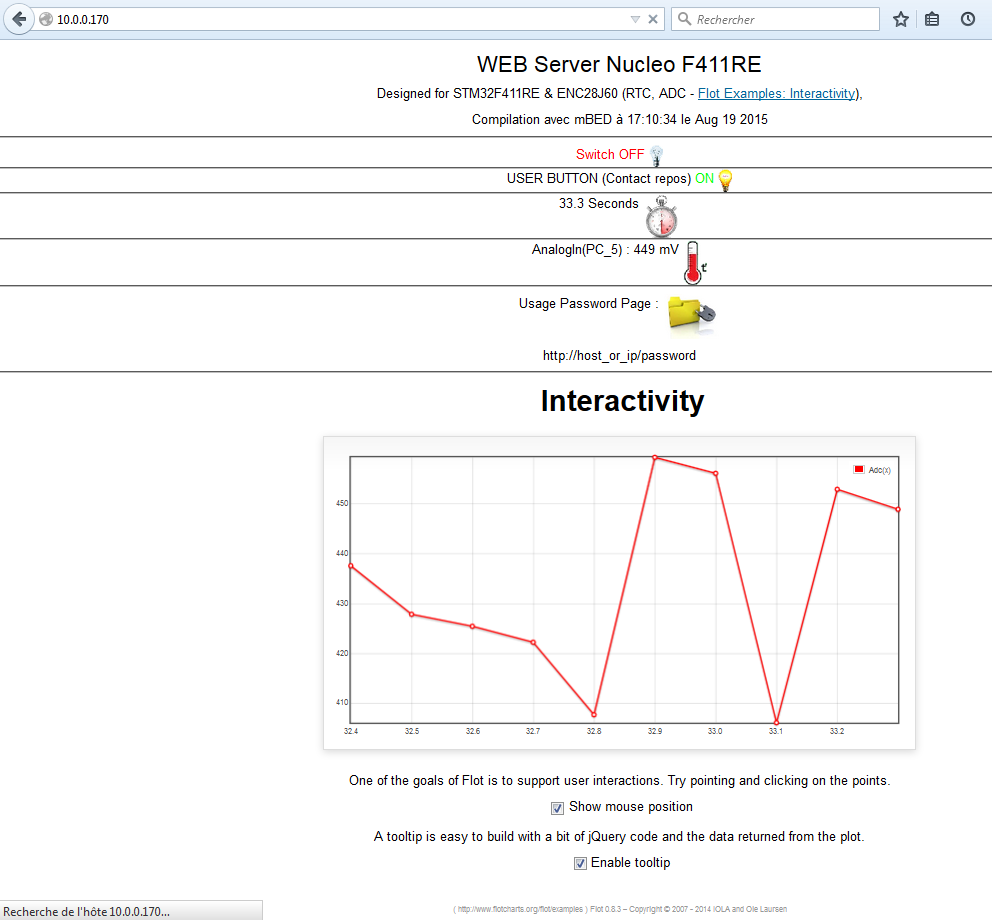
P.S : 1ère mise en fonctionnement de la carte NUCLEO STM32F411RET6 Instruction pour la mise en fonctionnement : https://developer.mbed.org/users/Fo170/notebook/the-stm32-nucleo-64-board/
Vue d'ensemble :
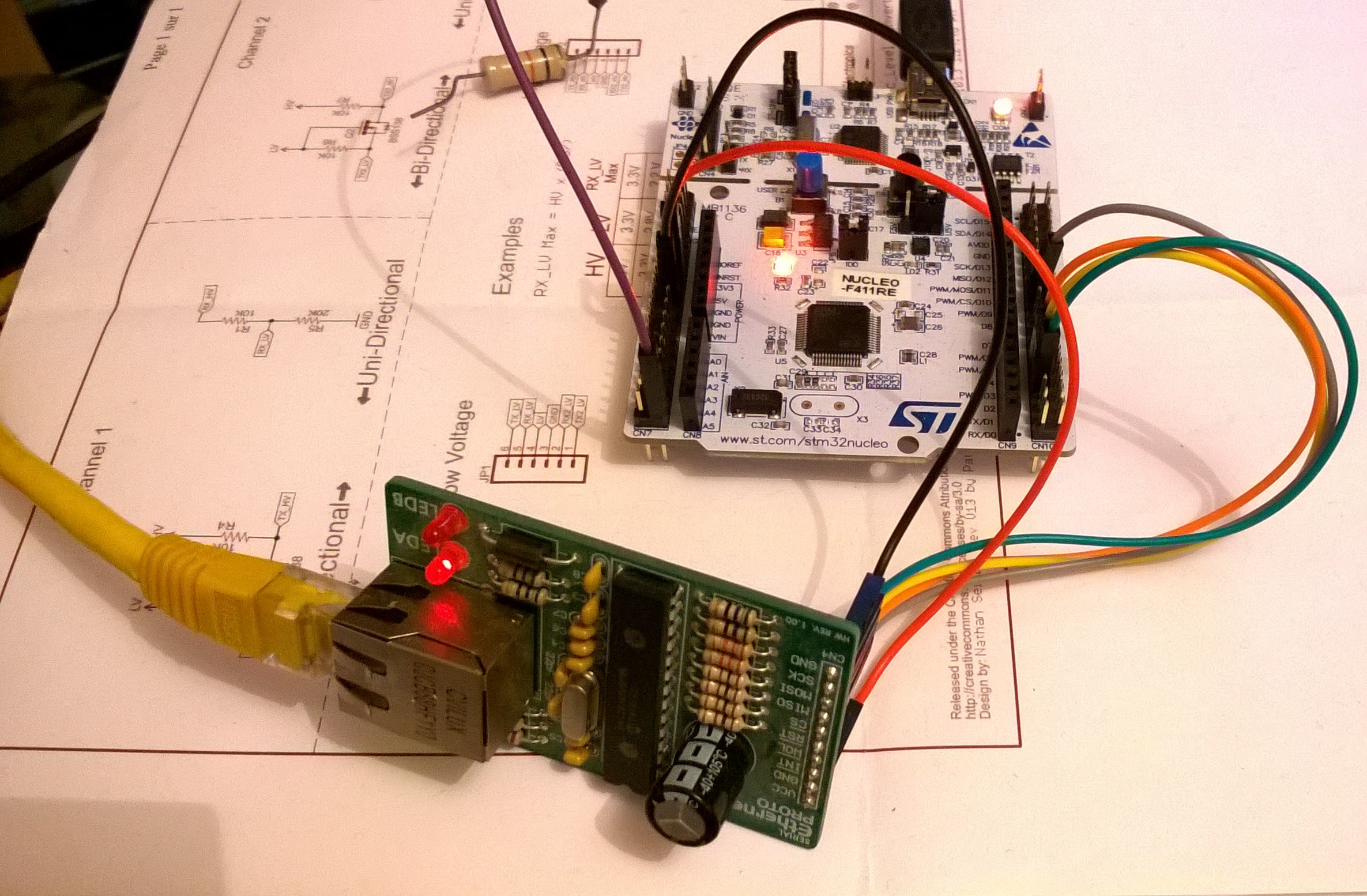
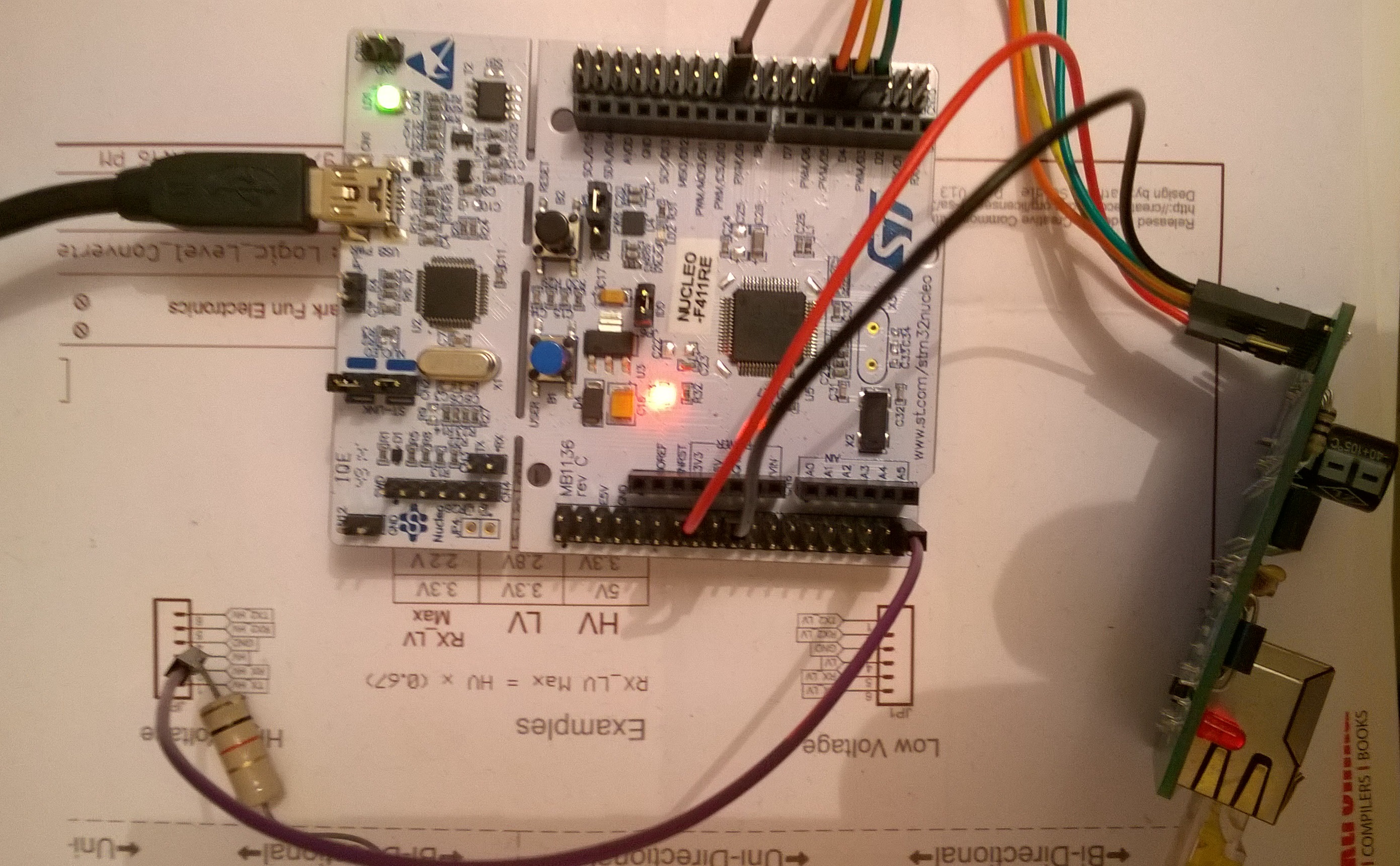
Vue de la carte ENC28J60 :
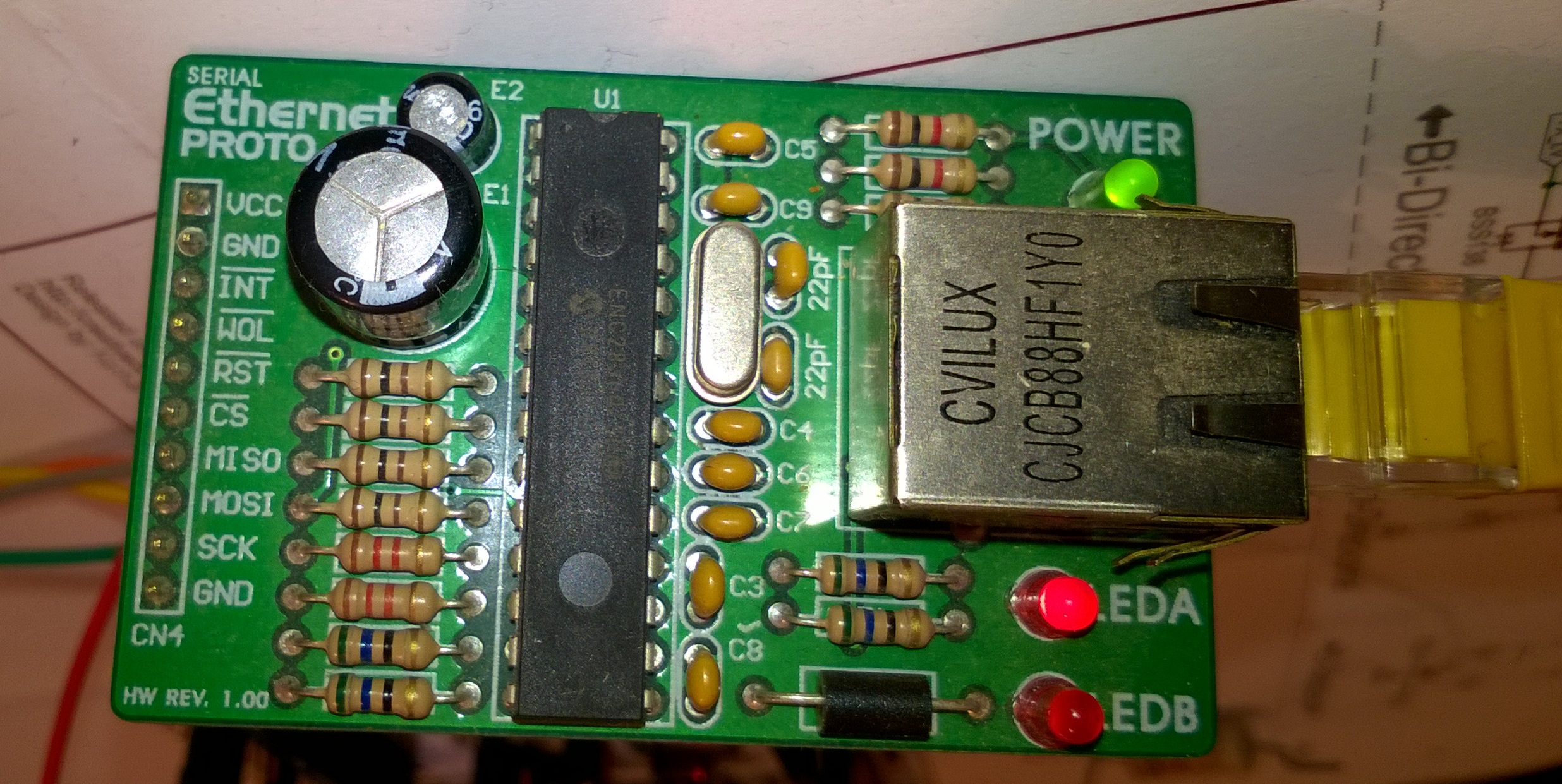
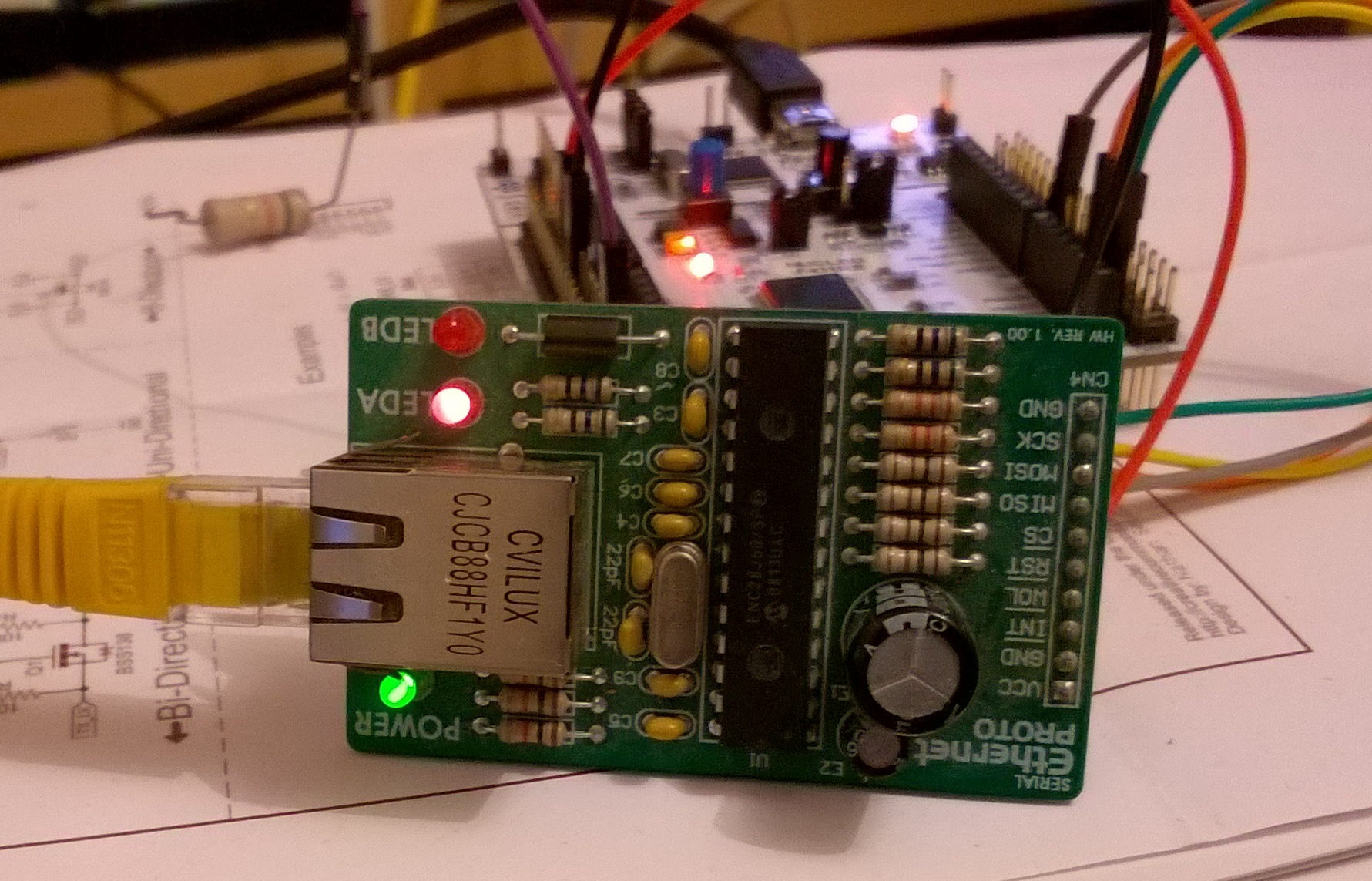
Carte Nucléo :
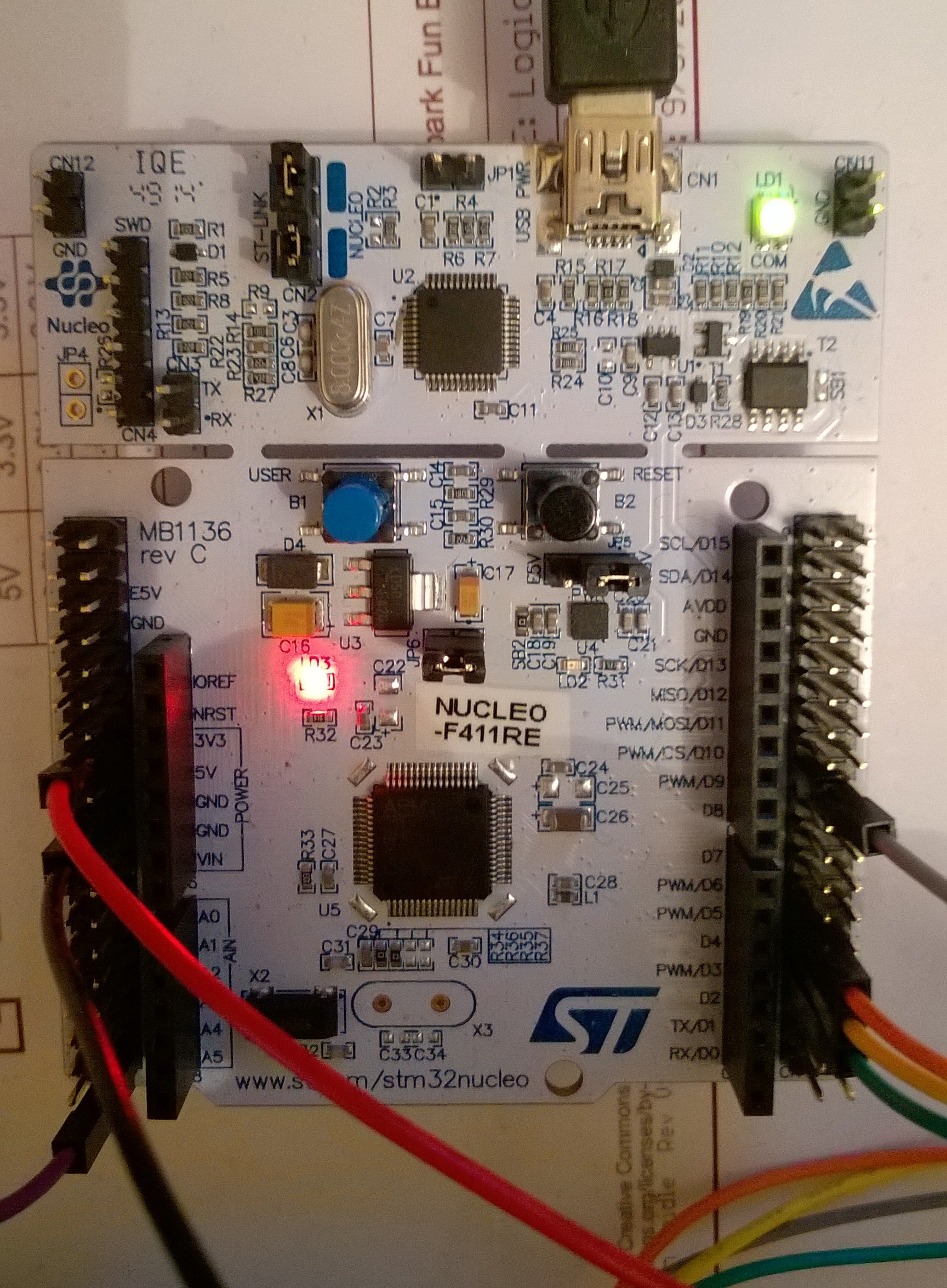
main.cpp
- Committer:
- Fo170
- Date:
- 2015-08-19
- Revision:
- 15:b241b1fccd1f
- Parent:
- 14:671fa04504c2
- Child:
- 16:c074bfec598f
File content as of revision 15:b241b1fccd1f:
/* In this example LED1 is switched on/off using a web browser connected to this HTTP server.
* The example is based on the Tuxgraphics Web Switch <http://www.tuxgraphics.org/>.
* This HTTP server is built around the the ENC28J60 chip
* driven by the UIPEthernet library <https://github.com/ntruchsess/arduino_uip>
* ported to mbed.
*/
#include <mbed.h>
#include <UIPEthernet.h>
#include <UIPServer.h>
#include <UIPClient.h>
#include <string>
// PC_5 (connectique Morpho) : Entrée Analogique (0 à 3.3V)
// Carte ENC28J60 <--> Nucleo F411RE
// PB_5 (connectique Morpho) : MOSI
// PB_4 (connectique Morpho) : MISO
// PB_3 (connectique Morpho) : SCK
// PB_6 (connectique Morpho) : CS
DigitalOut myled(LED1);
AnalogIn a_in(PC_5); // PC_5 au lieu de PC_0
DigitalIn button_usr(USER_BUTTON);
using namespace std;
// UIPEthernet is the name of a global instance of UIPEthernetClass.
// Do not change the name! It is used within the UIPEthernet library.
#if defined(TARGET_LPC1768)
UIPEthernetClass UIPEthernet(p11, p12, p13, p8); // mosi, miso, sck, cs
#elif defined(TARGET_LPC1114)
UIPEthernetClass UIPEthernet(dp2, dp1, dp6, dp25); // mosi, miso, sck, cs
#elif defined(TARGET_LPC11U68)
UIPEthernetClass UIPEthernet(P0_9, P0_8, P1_29, P0_2); // mosi, miso, sck, cs
#elif defined (TARGET_NUCLEO_F103RB)
UIPEthernetClass UIPEthernet(PB_5, PB_4, PB_3, PB_6); // mosi, miso, sck, cs
#elif defined (TARGET_NUCLEO_F401RE)
UIPEthernetClass UIPEthernet(PB_5, PB_4, PB_3, PB_6); // mosi, miso, sck, cs
#elif defined (TARGET_NUCLEO_F411RE)
UIPEthernetClass UIPEthernet(PB_5, PB_4, PB_3, PB_6); // mosi, miso, sck, cs
// If your board/plaform is not present yet then uncomment the following two lines and replace TARGET_YOUR_BOARD as appropriate.
//#elif defined (TARGET_YOUR_BOARD)
//UIPEthernetClass UIPEthernet(SPI_MOSI, SPI_MISO, SPI_SCK, SPI_CS); // mosi, miso, sck, cs
#endif
// Note:
// If it happends that any of the SPI_MOSI, SPI_MISO, SPI_SCK, SPI_CS pins collide with LED1 pin
// then either use different SPI port (if available on the board) and change the pin names in the constructor UIPEthernet(...) accordingly
// or instead of using LED1 pin, select a free pin (not used by SPI port) and connect to it an external LED which is connected to a resitor that is connected to the groud.
// In the second case remember to replace LED1 in sw(LED1) constructor (see below).
// MAC number must be unique within the connected network. Modify as appropriate.
const uint8_t MY_MAC[6] = {0x00,0x01,0x02,0x03,0x04,0x06};
// IP address must be also unique and compatible with your network. Change as appropriate.
const IPAddress MY_IP(10,0,0,170);
#define __IP_LOCAL__ "10.0.0.170"
/* Maison
const IPAddress MY_IP(192,168,0,170);
#define __IP_LOCAL__ "192.168.0.170"
*/
const string PASSWORD = "secret"; // change as you like
// In this example we are turning on/off LED1.
DigitalOut sw(LED1); // Change LED1 to a pin of your choice. However, make sure that it does not collide with any of the SPI pins already used in the UIPEthernet(...) constructor above!
#include <hebergement.h>
#include <Fct_Web.h>
#define NB_SAMPLES 10
unsigned long int Sample = 0;
float adc_samples[NB_SAMPLES];// = { 0.1,0.2,0.3,0.4,0.5,0.6,0.7,0.8,0.9,1.0,1.01,1.02,1.03,1.04 };
float time_samples[NB_SAMPLES];// = { -0.1,2,3,4,5,6,7,8,9,10,11,12,13,14 };
float x_min = 0.0, x_max = 0.0;
float y_min = 0.0, y_max = 0.0;
float Seconds = 0.0;
float meas = 0.0;
//------------
#define __Time_tic_in_Second__ 0.1
Ticker time_tic;
void add_one_tic()
{
int i;
Seconds = Seconds + (float)__Time_tic_in_Second__;
// mesures ADC
meas = a_in.read(); // Converts and read the analog input value (value from 0.0 to 1.0)
meas = meas * 3300.0; // Change the value to be in the 0 to 3300 range
x_min = x_max = Seconds;
y_min = y_max = meas;
for(i = 1 ; i < NB_SAMPLES ; i++)
{
time_samples[i-1] = time_samples[i];
adc_samples[i-1] = adc_samples[i];
if( time_samples[i] < x_min ) x_min = time_samples[i];
if( time_samples[i] > x_max ) x_max = time_samples[i];
if( adc_samples[i] < y_min ) y_min = adc_samples[i];
if( adc_samples[i] > y_max ) y_max = adc_samples[i];
}
adc_samples[NB_SAMPLES-1] = meas;
time_samples[NB_SAMPLES-1] = Seconds;
}
//------------
string& page(uint8_t status)
{
char buffer[128];
int i;
//char time_stamp[32];
//-------------
httpContent = str_DOCTYPE;
httpContent += str_meta_refresh;
httpContent += "\r\n<HTML><HEAD>\r\n";
httpContent += "<title>WEB Server Nucleo F411RE - ENC28J60 - Flot Examples: Interactivity</title>\r\n";
httpContent += str_favicon;
httpContent += str_JavaScript;
httpContent += "<script language=\"javascript\" type=\"text/javascript\">init_WebServerNucleo_Interactivity();</script>\r\n";
// Variables JavaScript
httpContent += "<script language=\"javascript\" type=\"text/javascript\">\r\n";
httpContent += "var color_Y = \"#FF0000\";\r\n";
httpContent += "var label_Y = \"Adc(x)\";\r\n";
//httpContent += "var x_min = -0.5, x_max = 14.5, y_min = -0.5, y_max = 1.5;\r\n";
sprintf(buffer, "var x_min = %.1f, x_max = %.1f, y_min = %.1f, y_max = %.1f;\r\n", x_min, x_max, y_min, y_max);
httpContent += buffer;
//httpContent += "var array_value = [[-0.1,0.1],[2,0.2],[3,0.3],[4,0.4],[5,0.5],[6,0.6],[7,0.7],[8,0.8],[9,0.9],[10,1],[11,1.01],[12,1.02],[13,1.03],[14,1.04]];\r\n";
if(Sample > NB_SAMPLES)
{
httpContent += "var array_value = [";
for(i = 0 ; i < NB_SAMPLES ; i++)
{
sprintf(buffer, "[%.1f,%.1f],", time_samples[i], adc_samples[i]);
httpContent += buffer;
}
httpContent += "];\r\n";
}
Sample++;
httpContent += "</script>\r\n";
// Fin Variable JavaScript
httpContent += "</HEAD><BODY>\r\n";
httpContent += "<center><h2>WEB Server Nucleo F411RE</h2>\r\n";
httpContent += "<p>Designed for STM32F411RE & ENC28J60 (RTC, ADC - <a href=\"http://www.flotcharts.org/flot/examples/interacting/index.html\">Flot Examples: Interactivity</a>),\r\n";
httpContent += str_Compilation_DATE_AND_TIME;
// httpContent += str_Logo_image;
httpContent += "<p></center>\r\n<hr><p>\r\n";
if(status == 1)
{
httpContent += "<font color=#00FF00>Switch ON</font> ";
httpContent += str_ampoule_ON;
httpContent += "\r\n";
}
else
{
httpContent += "<font color=#FF0000>Switch OFF</font> ";
httpContent += str_ampoule_OFF;
httpContent += "\r\n";
}
httpContent += "<hr>\r\n";
//-------------
httpContent += "(Contact repos) \r\n";
if(button_usr)
{
httpContent += "<font color=#00FF00>BUTTON ON</font> ";
httpContent += str_ampoule_ON;
httpContent += "\r\n";
}
else
{
httpContent += "<font color=#FF0000>BUTTON OFF</font> ";
httpContent += str_ampoule_OFF;
httpContent += "\r\n";
}
httpContent += "<hr>\r\n";
//-------------
/*
httpContent += "Local Time: ";
time_t seconds = time(NULL)+ 19800; // time(null) gives the GMT time .
// printf("Time as seconds since January 1, 1970 = %d\n", seconds);
strftime(time_stamp, 32, "%y %m %d, %H:%M:%Ss", localtime(&seconds));
// this converts the value in seconds obtained above to human readable format and assigns it to the timestamp
sprintf(buffer, "%s", time_stamp);// diplays the human readable time
*/
sprintf(buffer, "%.1f Seconds ", Seconds);// diplays the human readable Seconds
httpContent += buffer;
httpContent += str_chrono;
httpContent += "\r\n<hr>\r\n";
//----------------
httpContent += "AnalogIn(PC_5) : ";
sprintf(buffer, "%.0f mV ", meas);
httpContent += buffer;
httpContent += str_thermometre;
httpContent += "<hr>\r\n<p>Usage Password Page :<p>http://host_or_ip/password<p><hr>\r\n";
httpContent += "<script language=\"javascript\" type=\"text/javascript\">WebServerNucleo_Interactivity();</script>\r\n";
httpContent += "</BODY></HTML>";
//-----------
//wait(1);
return httpContent;
}
int main()
{
// RTC
//set_time(1387188323); // Set RTC time to 16 December 2013 10:05:23 UTC
// Date and time are set.
// initialisation des variables
int i;
for(i = 0 ; i < NB_SAMPLES ; i++)
{
time_samples[i] = 0;
adc_samples[i] = 0.0;
}
// Init the ticker with the address of the function (add_one_second) to be attached and the interval (1000 ms)
time_tic.attach(&add_one_tic, __Time_tic_in_Second__);
// interval: 200 micro seconds chaques samples
//time_measurement_ADC.attach_us(&measurement_ADC, TIME_SAMPLES_us);
HTTP_LOOP();
}
 FOURNET Olivier
FOURNET Olivier
